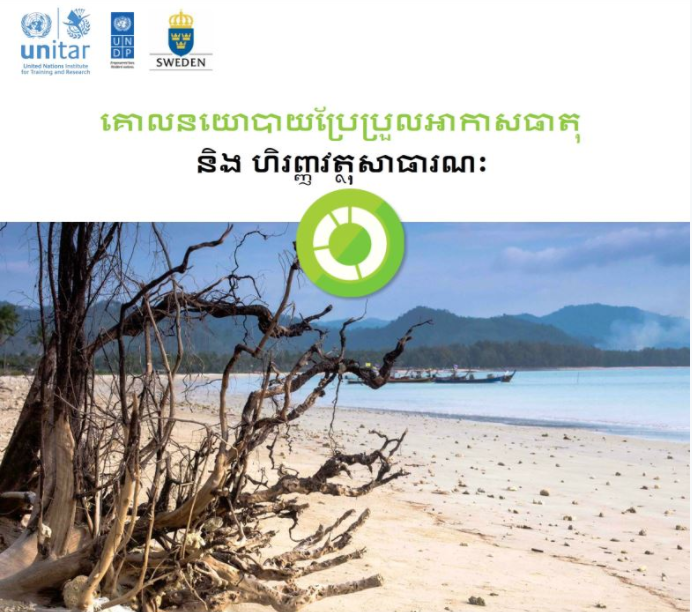- ផ្នែកទី ១ តើអ្វីជាការប្រែប្រួលអាកាសធាតុ?
- ផ្នែកទី ២ តើអ្វីកំពុងកើតឡើងនៅតំបន់អាស៊ី និង ប៉ាស៊ីហ្វិក?
- ផ្នែកទី ៣ តើការប្រែប្រួលអាកាសធាតុប៉ះពាល់ការងាររបស់អ្នកជាមន្រ្តីរាជការយ៉ាងដូចម្តេច?
- ផ្នែកទី ៤ ហិរញ្ញវត្ថុជាតិ និង អន្តរជាតិសម្រាប់ការប្រែប្រួលអាកាសធាតុ
- ផ្នែកទី ៥ ក្របខ័ណ្ឌយុទ្ធសាស្រ្តសម្រាប់គ្រប់គ្រងការប្រែប្រួលអាកាសធាតុ
ផ្នែកទី ១ នៅក្នុងផ្នែកនេះ អ្នកនឹងសិក្សាអំពីប្រព័ន្ធអាកាសធាតុ និង បម្រែបម្រួលដែលយើងបានសង្កេតតាំង ពីចុងទសវត្សទី ១៩ រួមមាន ការកើនឡើងសីតុណ្ហភាព, ការប្រែប្រួលរបបទឹកភ្លៀង, អាស៊ីតកម្ម មហាសមុទ្រ និង បញ្ហាដទៃផ្សេងទៀត ។ ផ្នែកនេះពិពណ៌នាអំពីការប្រែប្រួលអាកាសធាតុដែល យើងរំពឹងទុកនាពេលអនាគត ។
ផ្នែកទី ២ ក្នុងផ្នែកនេះ អ្នកនឹងសិក្សាអំពីលក្ខខណ្ឌជាក់លាក់ និង ឥទ្ធិពលនៃការប្រែប្រួលអាកាសធាតុក្នុងតំបន់អាស៊ី-ប៉ាស៊ីហ្វិក ។ ផែ្នកនេះក៏បង្ហាញអ្នកអំពីទស្សនាទាននៃការទប់ស្កាត់ និង ការសម្របខ្លួនទៅនឹងការប្រែប្រួលអាកាសធាតុ ព្រមទាំងផ្តល់នូវឧទាហរណ៍ជាក់ស្តែងក្នុងតំបន់អាស៊ី-ប៉ាស៊ីហ្វិក ។
ផ្នែកទី ៣ តាមរយៈឧទាហរណ៍ជាច្រើន ផ្នែកនេះនឹងបង្ហាញអ្នកថាតើការទប់ស្កាត់ និង សម្របខ្លួនទៅនឹង ការប្រែប្រួលអាកាសធាតុពាក់ព័ន្ធជាមួយការងាររបស់មន្រ្តីរាជការតាមច្រើនរូបភាពដូចជា ការដឹកជញ្ជូន ថាមពល ផែនការ និង ហិរញ្ញវត្ថុ ។
ផ្នែកទី ៤ ក្នុងផ្នែកនេះ អ្នកនឹងសិក្សាអំពីទំហំ ប្រភព និង ភាពស្មុគ្រស្មាញនៃលំហូរហិរញ្ញវត្ថុអាកាសធាតុ ។ វានឹងពិភាក្សាអំពីតួនាទីរបស់តួអង្គអន្តរជាតិ ជាតិ សាធារណៈ និង ឯកជន ។
ផ្នែកទី ៥ ផ្នែកនេះចែកចេញជាពីរភាគ ។ ភាគទី ១ និយាយអំពីប្រព័ន្ធគ្រប់គ្រងហិរញ្ញវត្ថុសាធារណៈរបស់ប្រទេស មួយ ដោយផ្តោតទៅលើដំណើរការថវិកាជាតិ ។ ភាគទី ២ បង្ហាញថាតើប្រព័ន្ធផែនការ និង ថវិកាជាតិ អាច ផ្តល់មូលដ្ឋានសម្រាប់ការគ្រប់គ្រងកាន់តែប្រសើរនូវហិរញ្ញវត្ថុអាកាសធាតុយ៉ាងដូចម្តេច ។


